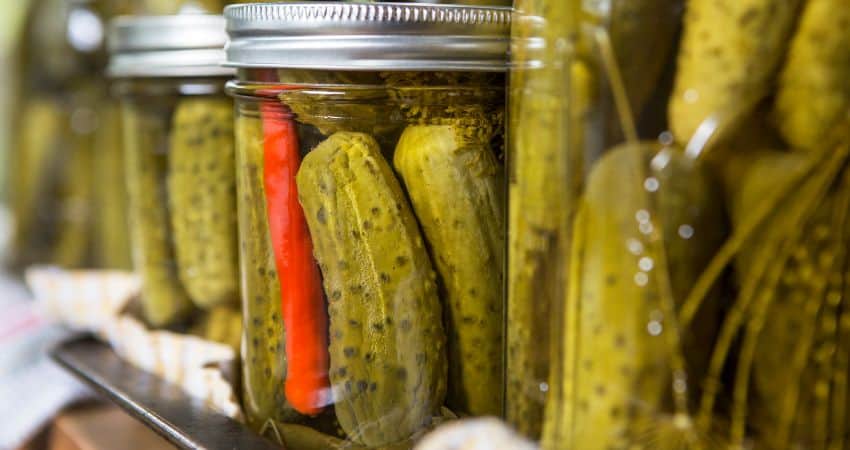A Guide To Storing Pickles
Let’s examine the best way to store pickles.
The best way to store an unopened jar of pickles is in a cool, dry place for two or more years. Store opened jars of pickles in the refrigerator where it will remain fresh for up to two years.
The shelf life for a jar of pickles is about two years. Therefore, the critical food safety factor is proper storage. I have researched this topic prior to this article because many people have asked me during my health coaching sessions. Let’s take a close look.
Safe Storage of Pickles Begins With Safe Pickling and Use Practices

The recommended shelf life for pickles assumes a hygienic pickling process. The brine itself is a deterrent to bacteria, but a sterile environment should be maintained during the pickling process1.
Commercial canning is regulated for safety, but you will regulate home pickling safety.
The jar of pickles you buy at the store will have a sell-by date, but that date is not an expiration date. The pickles are safe and good to eat months later when they are correctly sealed.
The sell-by date means the pickles are at their best if eaten before that date.
Once the pickle jar is opened, refrigerating them prevents bacteria from forming. Keep the lid tight and use tongs to extract the pickle. Your fingers have bacteria on them, so don’t stick them in the pickle jar.
When you stock canned foods, including pickles, don’t store more than you will consume within a year. If they’re still there after a year, they’re still okay to eat, but the quality will deteriorate somewhat over time.
Disclaimer: Some links in this article are affiliate links which means I may earn a small commission at no extra cost to you. As an Amazon associate I earn from qualifying purchases.
Why Are Some Pickles Refrigerated in Stores?
Commercially produced pickles are typically found on store shelves along with condiments, but some are sold refrigerated. They do taste better cold and have a crispy snap when you bite into them. However, that’s not why they are refrigerated.
Store pickles are refrigerated because they have not been pasteurized. Pasteurization of solid food, like pickles, is a heat treatment that destroys pathogens and microorganisms. The heat stops the fermentation process, which makes the pickles shelf stable for a long time.
Unpasteurized pickles have been untreated with heat and vinegar, salt, and water brine kill the microorganisms and pathogens during the fermentation process. However, brine does not kill probiotics.
Therefore, to stop the fermentation, the pickles must be refrigerated. If you leave them at room temperature, the fermenting process will continue. Eventually, you’ll end up with bitter limp pickles2.
Both pasteurized and unpasteurized pickles are tasty and good for you. However, unpasteurized pickles have more probiotics for gut health.
Amazon sells every kind of pickle including kits and pickle juice. Check them out on Amazon here, Pickles.
Storing Homemade Pickles During Fermentation

During the time cucumbers or other vegetables are fermenting, store them in a cool dark area. The process should take one to two weeks. Make sure the pickles stay submerged well under the brine at all times.
The fermenting container should be open to the air, but a light covering like a dish towel will keep the dust from flying into the pickles.
When fermentation is complete, clean and dry the mouth of the jar and the lid thoroughly, then seal tightly to prevent mold growth.
The Best Storage Containers for Both Home Made and Commercial Pickles
Most jars of pickles you see in stores are made from glass or clear plastic. However, if you do your own pickling at home, you can use plastic containers or glass canning jars.
Pickles are acidic, so don’t use metal containers because the reaction will release dangerous toxins into the food3.
Glass is best for storing pickles. Acidic products like pickles do not react to glass because glass is inert and there is no chemical interaction. Glass is nonporous, so it doesn’t absorb flavors as plastic does and it is reusable.
Foods look appetizing in a glass jar, but don’t line them up on your window sill. Light exposure can degrade the contents of glass containers. Once sealed, store the jars in a dark place like a cabinet or pantry shelves. Of course, they’re fine stored in the refrigerator as well.
Once a jar is opened, reseal it tightly after every use for maximum freshness.
Signs Something Went Wrong During Pickling or Storage
Pickling and proper storage of pickles is a straightforward process and very little can go wrong. Some signs4 indicate the pickles have gone bad, but it’s a rare occurrence. Let’s take a look at signs pickles have gone bad:
- If the sell-by date is over four years ago, the pickles lose their crisp and crunch.
- Mold buildup around the jar’s neck, inside the lid or on the pickle is a clear sign to discard the pickles.
- Any unusual odor when opening the jar is an indication they may be bad.
- If the screw top is popped, throw them away, as bacteria may be at work in the jar.
Definition of Pickle and Why It’s Important For Storage
The common definition for the word pickle is a pickled cucumber. However, a jar of pickled cucumbers is unlabeled as such. Instead, the label reads sweet pickles, dill pickles, butter pickles and so on.
That is the commonly accepted definition of pickles.
However, we can preserve fruits, vegetables, and even eggs for the future using the pickling process5. Therefore, those labels will say pickled peppers, pickled eggs or whatever has been pickled.
Therefore, a jar of anything pickled can be defined as a jar of pickles. That’s good because we can enjoy many out-of-season foods long past their harvest date.
As a bonus, the pickles and pickling brine contain probiotics and antioxidants6.
Pickles For Keto? Pickles are keto friendly as long as they don’t have added sugars. Avoid candies, sweet and bread and butter pickles. Check out this simple to follow plan for only 28 days, The 28-Day Keto Challenge and you can Succeed!
If you have any questions to ask me about this article don’t hesitate to comment below or email us. You can find an email on our contact page.
Read Next – More Food Storage Articles!
Can Oatmeal Go bad? (Find Out Here)
Plastic Food Storage Bag Safety Guide
The Ultimate Guide To Preserving And Storing Tofu
- Michigan State University: Michigan Fresh: Using, Storing, and Preserving Cucumber Pickles [↩]
- ACS Publications: Effect of water stress on stored pickling cucumbers [↩]
- Montana State University Extension: Pickling [↩]
- National Center for Home Food Preservation: Preparing and Canning Fermented Foods Dill Pickles [↩]
- ScienceDirect: Traditionally fermented pickles: How the microbial diversity associated with their nutritional and health benefits? [↩]
- Cleveland Clinic: 6 Health Benefits of Drinking Pickle Juice [↩]
